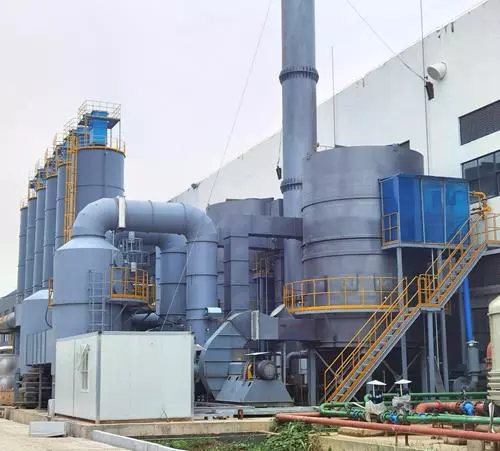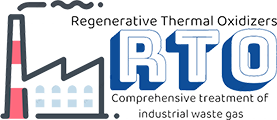What industries use RTO thermal oxidizers?
вступ
In today’s industrial landscape, the utilization of RTO (Regenerative Thermal Oxidizers) thermal oxidizers has become an integral part of various industries. RTOs are highly efficient and cost-effective systems used for the control of air pollution, specifically for the treatment of volatile organic compounds (VOCs) and hazardous air pollutants (HAPs). This article explores the industries that extensively employ Термічний окислювач RTO
s and examines their importance in each sector.
1. Chemical Industry
– RTO thermal oxidizers are widely used in the chemical industry due to the high levels of VOC emissions during the production processes. The oxidizers effectively eliminate harmful pollutants, ensuring compliance with environmental regulations.
– Chemical manufacturing facilities, including fine chemical production plants, rely on RTO thermal oxidizers to control emissions from various processes such as solvent recovery, distillation, and chemical reactions.
– The versatility of RTO thermal oxidizers allows for the treatment of a wide range of chemical compounds, making them suitable for different applications within the industry.
2. Pharmaceutical Industry
– The pharmaceutical industry heavily depends on RTO thermal oxidizers to mitigate emissions resulting from the production of active pharmaceutical ingredients (APIs), drug formulation, and sterilization processes.
– RTOs offer a reliable solution for the destruction of VOCs and HAPs generated during the synthesis of pharmaceutical compounds, ensuring a safe working environment and compliance with strict regulatory standards.
– The ability of RTO thermal oxidizers to handle varying process exhaust volumes and compositions makes them an ideal choice for pharmaceutical companies with diverse production operations.
3. Automotive Industry
– Automobile manufacturing plants incorporate RTO thermal oxidizers to treat emissions from painting and coating processes, which involve the use of volatile organic compounds and other hazardous substances.
– By employing RTOs, the automotive industry effectively reduces harmful pollutant levels, contributing to improved air quality and sustainability efforts.
– The high destruction efficiency and thermal energy recovery capabilities of RTO thermal oxidizers provide energy-saving benefits to the automotive sector while ensuring compliance with emissions regulations.

4. Food Processing Industry
– RTO thermal oxidizers are utilized in the food processing industry to control emissions produced during cooking, baking, and frying processes that involve the release of volatile organic compounds, odorous gases, and particulate matter.
– The implementation of RTOs ensures compliance with air quality regulations and helps maintain a hygienic work environment by eliminating odors and harmful pollutants.
– Food processing facilities benefit from the low operating costs and high destruction efficiency of RTO thermal oxidizers, making them an environmentally sound choice for emission control.
5. Printing Industry
– Print shops and printing presses utilize RTO thermal oxidizers to treat emissions resulting from ink drying and curing processes, which release VOCs and hazardous air pollutants.
– The installation of RTOs enables the printing industry to minimize its environmental impact by effectively dealing with emissions and preventing them from being released into the atmosphere.
– RTO thermal oxidizers offer a reliable and efficient solution for controlling emissions in the printing industry, ensuring compliance with air quality regulations and maintaining a safe workplace.
Висновок
RTO thermal oxidizers play a crucial role in various industries, including the chemical, pharmaceutical, automotive, food processing, and printing sectors. These highly efficient systems effectively mitigate emissions of volatile organic compounds and hazardous air pollutants, contributing to improved air quality and environmental sustainability. By adopting RTOs, industries not only comply with stringent regulatory standards but also demonstrate their commitment to responsible resource management and pollution control.
What industries use RTO thermal oxidizers?
Our company is a high-end equipment manufacturing enterprise that focuses on the comprehensive treatment of volatile organic compounds (VOCs) exhaust gas and carbon reduction and energy-saving technology. We possess four core technologies: thermal energy, combustion, sealing, and automatic control. Additionally, we have the capabilities for temperature field simulation, air flow field simulation modeling, ceramic heat storage material performance, molecular sieve adsorbent material selection, and high-temperature incineration and oxidation characteristics testing of VOCs organic compounds.
Our team has established RTO technology research and development center and exhaust gas carbon reduction engineering technology center in Xi’an, as well as a 30,000 square meter production base in Yangling. We are a leading manufacturer of RTO equipment and molecular sieve rotary wheel equipment globally. Our core technical team comes from the Aerospace Liquid Rocket Engine Research Institute (Aerospace Sixth Institute). Currently, we have more than 360 employees, including over 60 research and development technology backbones, including 3 senior engineers with the researcher level, 6 senior engineers, and 10 thermodynamics doctors.
Our core products are the rotary valve regenerative thermal oxidizer (RTO) and molecular sieve adsorption concentration rotary wheel. With our own expertise in environmental protection and thermal energy system engineering, we can provide customers with comprehensive solutions for industrial exhaust gas treatment and carbon reduction through heat utilization, catering to various operating conditions.

Our company has obtained various certifications, qualifications, patents, and honors, including the Intellectual Property Management System Certification, Quality Management System Certification, Environmental Management System Certification, Construction Industry Enterprise Qualification, High-tech Enterprise, Rotary Heat Storage Oxidation Furnace Rotary Valve Patent, Rotary Heat Storage Incineration Equipment Patent, Disc Molecular Sieve Rotary Wheel Patent, and more.
How to choose the right RTO equipment:
- Determine the characteristics of the exhaust gas
- Understand local regulations and emission standards
- Evaluate energy efficiency
- Consider operation and maintenance
- Budget and cost analysis
- Select the appropriate RTO type
- Environmental and safety considerations
- Performance testing and verification
It is important to thoroughly understand the composition and properties of the exhaust gas in order to select the appropriate RTO equipment.
Familiarize yourself with the regulations and emission standards set by local authorities to ensure compliance and avoid any potential legal issues.
Assess the energy efficiency of different RTO equipment options to minimize energy consumption and reduce operational costs.
Take into account the ease of operation and maintenance requirements of the RTO equipment to ensure smooth operation and longevity.
Analyze the budget and cost implications of different RTO equipment options, including initial investment, operating costs, and potential savings.
Choose the RTO type that best suits the specific needs and requirements of your industry and application.
Consider environmental and safety factors when selecting RTO equipment to ensure compliance and protect the well-being of workers and the surrounding environment.
Perform thorough performance testing and verification of the selected RTO equipment to ensure its effectiveness in treating the exhaust gas.

Our service process:
- Consultation and evaluation
- Design and solution formulation
- Production and manufacturing
- Installation and commissioning
- After-sales support
Initiate preliminary consultation, conduct on-site inspections, and analyze customer requirements.
Design the solution, perform simulation and modeling, and conduct solution review.
Customize production, control quality, and conduct factory testing.
Carry out on-site installation, commissioning, and provide training services.
Provide regular maintenance, technical support, and supply spare parts.
We are a one-stop solution provider with a professional team that tailors RTO solutions to customers’ specific needs.
Автор: Мія
